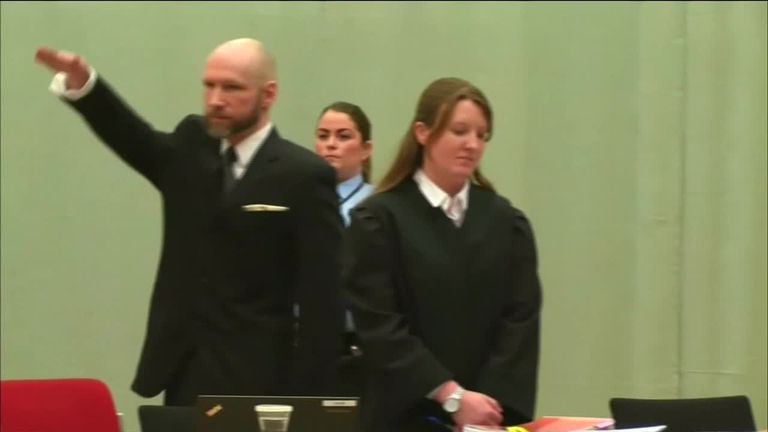Far-right extremism: New Zealand shootings could trigger copycat attacks
Cases of anti-Muslim, antisemitic, pro-white-supremacist activity are on the rise across the world, according to experts.
Saturday 16 March 2019 21:17, UK
The suspected gunman in the New Zealand massacre said no one instructed him to conduct his rampage but suggested associates of a Norwegian mass-murderer gave their blessing.
A manifesto published online by the man who gave his name as Brenton Tarrant voiced support for a number of far-right extremists, in particular Anders Breivik, who killed 77 people, many of them teenagers, in Norway's worst peacetime atrocity eight years ago.
Adopting the crusader-style language used by Breivik about a supposed secret Knights Templar group, Tarrant claimed: "I have only had brief contact with Knight Justiciar Breivik, receiving a blessing for my mission after contacting his brother knights."
A lawyer for Breivik told a Norwegian newspaper he found it very hard to believe that his client - serving 21 years in prison - could have had contact with the suspect.
The killing of 50 people at two mosques in Christchurch on Friday is one of the bloodiest examples of apparent far-right violence in recent years.
But cases of anti-Muslim, antisemitic, pro-white-supremacist activity are on the rise across the world, according to experts.
Julia Ebner, of the Institute for Strategic Dialogue, said the New Zealand atrocity could trigger copycat attacks.
"The manifesto can be read almost as a call to action," she said.
"It is trying to further polarise but also create fear and anger in our societies and to incite violence and this war that the perpetrator wants to spark."
New Zealand is not known as a hotbed of far-right extremism.
But scores of groups are thought to exist, linking up online with others around the world.
"These people are probably in all our communities," said Helen Clarke, a former prime minister of New Zealand.
"Some of them work themselves up to the point where they will commit mass murder as these people have done with devastating effects on a community in Christchurch."
Analysts say divisive language by certain politicians is helping to fuel far-right extremism.
Two years ago Donald Trump came under fire over his response to a white supremacist rally in Charlottesville, Virginia.
He's also been criticised for a so-called Muslim travel ban.
"There is a strong view out there that people like President Trump are fuelling this poisonous right wing and these acts are happening as a result of that rubber stamping by such," said Mohammed Khaleil, a Muslim community leader.
"I'm afraid, to put it bluntly, some people feel President Trump has blood on his hands."
The president took to Twitter to condemn the Christchurch killings.
"My warmest sympathy and best wishes goes out to the people of New Zealand after the horrible massacre in the Mosques," he wrote.
"49 innocent people have so senselessly died, with so many more seriously injured. The US stands by New Zealand for anything we can do. God bless all!"
But the suspected gunman wrote in his manifesto that he supports the president as a symbol of renewed white identity, though not as a leader.
Tarrant also revealed he had travelled to France, Spain and other Western European countries over the past two years.
It also emerged that he visited Turkey on multiple occasions. A photograph of him in the country has appeared in Turkish media outlets.
The authorities will be tracing his movements to see if he met others who share his views.
The murder of so many innocent worshippers has triggered international outrage, including in Bangladesh. The country's cricket team had been in Christchurch at the time of the killing, with members even due to pray at one of the targeted mosques. They were not harmed.








